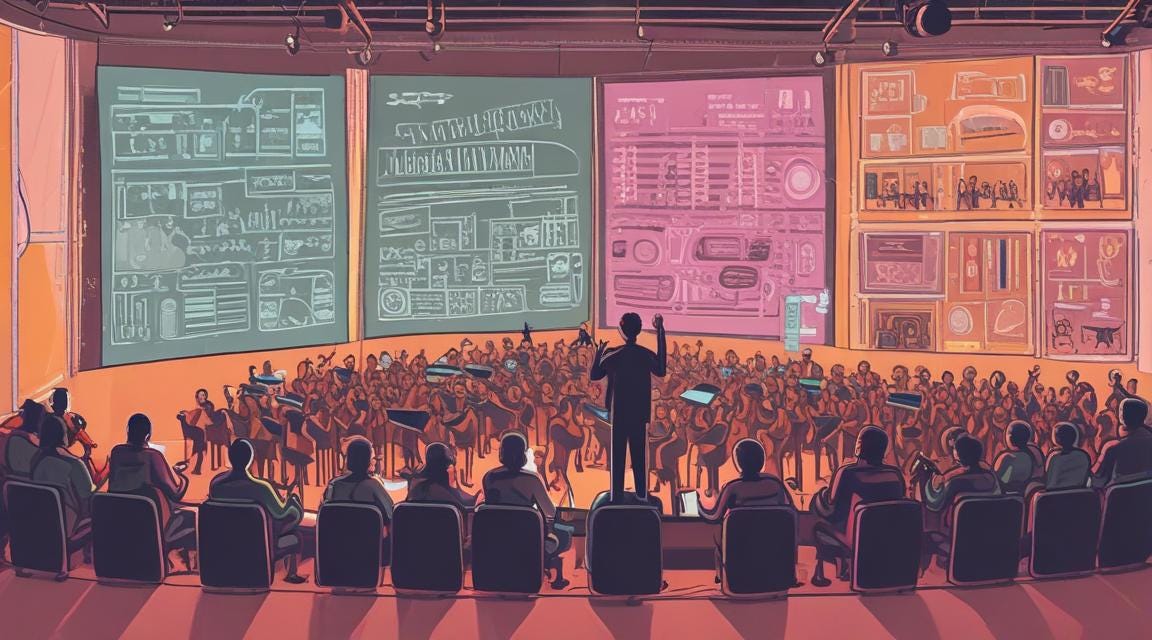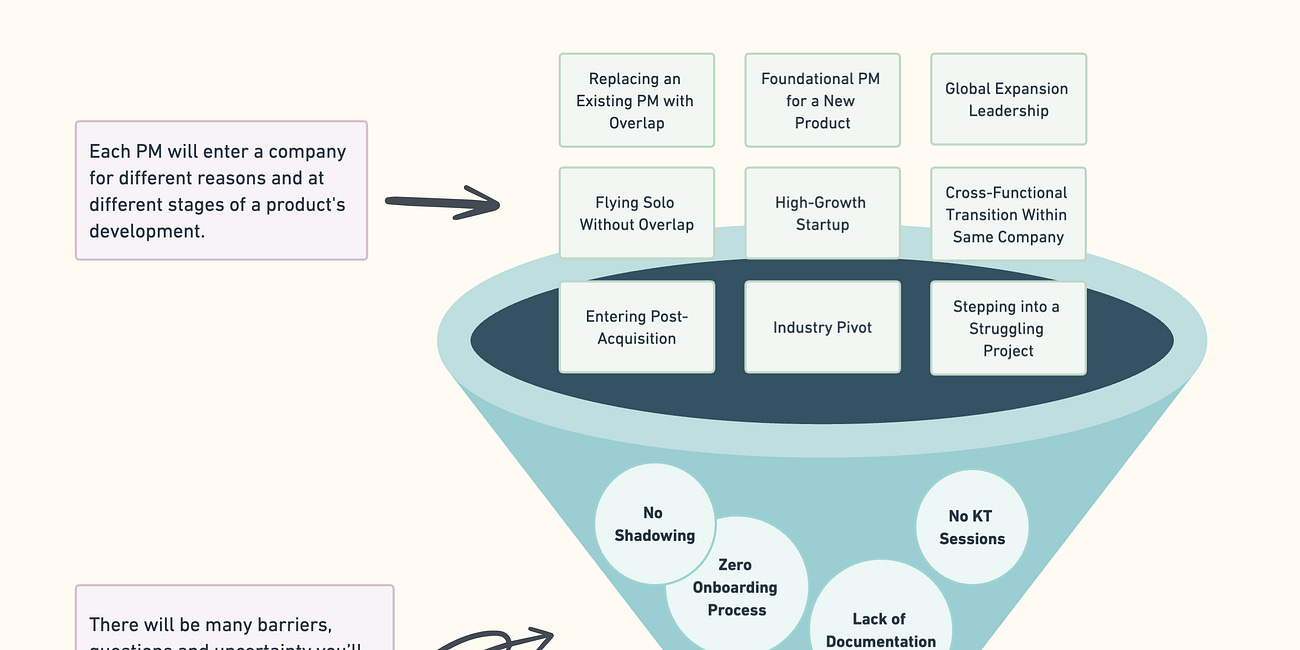From Code to Product Thinking: A Software Engineer's Guide to Becoming a Product Manager
Forward this quick guide to your engineering colleagues who want to move into product management.
The transition from software engineer to product manager is like going from classical pianist to orchestra conductor. As a pianist, you focus deeply on your instrument, mastering the technical skills to produce beautiful music, similar to writing code and debugging as an engineer.
However, when you become a conductor, your role expands to overseeing the entire orchestra, ensuring that all parts-strings, brass, woodwinds, and percussion-harmonize to perform a symphony. In this case, you don't just play one instrument, but direct the overall performance, making strategic decisions to bring the composition to life for the audience.
This is product management.

Transitioning from software engineer to product manager is similar to that from classical pianist to orchestra conductor. In the first case, you focus deeply on your instrument, mastering the technical skills to produce beautiful music. But as your role expands, you direct the overall performance, making strategic decisions to bring the composition to life for the audience.
Understanding the Value of a Product Manager
I remember there was a time when I didn't understand the activities and the importance of this job. Initially, I was under the impression that a PM was simply a project manager focused on tracking deadlines and churning out user stories, largely influenced by wrong corporate practices I had encountered.
Think of a product manager not as a taskmaster, but as a bridge between the technical expertise and the needs of the end user.
Unlike traditional project managers who focus on timelines, scope, and resources, product managers focus on the 'why' and 'what'—why we're building what we're building and what exactly needs to be built to solve real problems for our users.
PMs take on the responsibility of ensuring the product will be successful in the market, allowing software engineers to focus on the 'how'—how to technically achieve these goals.
Product managers are the ones who drill down into what users want, design the product roadmap, and translate user needs and business goals into a language and framework that any engineer can use. This not only makes development more satisfying, but also ensures that the products they develop have a real and positive impact on users.
That’s the product manager job, so if you want to transition into this exciting role, keep reading! 👇
Expand Not Only Your Skillset, But Your Mindset As Well
I successfully moved from software engineering to product management, so yes, it is possible. Even if you are used to being the lone wolf. 🐺
But let me also tell you the job is not for everyone. I’m not going to lie to you, I've seen software engineers attempt the transition and fail miserably.
Why did they fail?
Successful transition to product management depends on developing the right skills and a growth mindset.
The problem sometimes is that some engineers are too stuck on the technical side of things rather than seeing the world from the business perspective. For example, engineers can quickly identify the dumbest customer ideas. But they lack the curiosity to understand what needs are driving the customer's request in first place.
It is in these situations that a PM, sufficiently motivated by curiosity, can translate this request into:
❓ What the customer is really asking for is “this thing” not what they asked for in the first place.
🎯 If we implement it, not only will it satisfy their need, this will translate into a measurable advantage over our competitors.
Apart from mentality, there are other skills to learn. Many more, in my opinion.
Fortunately, you don’t need to start from scratch!
Great news, software engineers possess a set of transferable skills that can be highly valuable when moving into a product management role. These skills provide SW with a solid foundation for the varied and strategic demands of product management.
Take a look at the next diagram, what do you see? 👇
When you are a new born PM, having some sort of guidance is great. The 90 days plan hold my back on this transition. Apart of being very specific of what to focus on, it allows any new PM to fully onboarding into any company. I wrote about this in this post which keeps being pretty popular.👇
How to Onboard Yourself to a New Position
It's been a while since I've talked about joining a new position. My last post on the subject was based on the amazing guide "Cracking the PM Career" by Jackie Bavaro and Gayle Laakmann. But now that I reread this old post of mine, I realize that I can dig deeper into these tips to even better represent the chaos we face as PMs, and show you the methods…
Taking that into account. This is what I did 👇
🧠 Understanding the Product
First, I concentrated on the basic yet foundational skills to get a full grasp of my new environment.
Skills I focused on:
Business and Market Analysis: I delved deep into the products I manage—features, user base, technology stack, and how these align with our business goals.
Cross-functional Collaboration: I started understanding our market and industry, competitors, trends, and customer segments to see where our product stands.
Communication: I learned about our core values and the ways we work, getting to grips with both the formal procedures and the informal dynamics that shape our workspace.
🧩 Integration and Planning
With a solid foundation, I began integrating this knowledge with strategic application and more complex responsibilities.
Skills I developed:
Data Analysis: I began developing (or refining) our product’s strategic direction, aligning it with the company’s overarching goals and market position.
Ownership Mentality: Communication is key and owning the role as well. You really need to believe it! So I reached out to departments like sales, marketing, and customer support, figuring out how to effectively communicate and collaborate with them.
Project Management: I delved into some analytics, learning about key performance indicators (KPIs) and how to leverage data and user feedback.
🚀 Execution
After gaining more confidence in the role, I focused on leading the direction and driving the execution of our strategies, incorporating feedback along the way.
Skills I perfected at this point:
Leadership: I took the lead in meetings and made critical decisions about product features and enhancements.
Stakeholder Management: I focused on fortifying relationships with key stakeholders, understanding their expectations, and leveraging that insight to shape our product strategy.
Execution and Strategy: I was hands-on in adjusting our approach based on feedback, pivoting our strategy as needed, fully informed by insights and data. Of course, you will need to learn from mistakes!
How To Speed Up Your Learning?
Below you will find a variety of resources, including books, podcasts, videos, courses, and other online resources that can help, specifically software engineers, to learn about becoming product managers.
Books 📚
"Inspired: How to Create Products Customers Love" by Marty Cagan Amazon
"The Lean Product Playbook" by Dan Olsen Amazon
"Cracking the PM Interview" by Gayle Laakmann McDowell and Jackie Bavaro Amazon If you read it, consider continue with "Cracking the PM Career" from the same authors.
"The Product Manager's Survival Guide" by Steven Haines Amazon
Podcasts 🎙️
The Product Thinking Podcast by Melissa Perri Website
The Product Manager Podcast Website
Lenny’s Podcast Substack
One Knight in Product by Jason Knight Website
Videos 🎬
Product Management for Software Engineers by Jackie Bavaro.
Courses 🏛️
Introduction to Product Management by Coursera Coursera
Become a Product Manager | Learn the Skills & Get the Job by Udemy Udemy
Other Online Resources 📑
Mind the Product Website
ProductCoalition Website
Product School's Product Management Blog Blog
Silicon Valley Product Group (SVPG) Insights Blog
Forums 💬
Product Management subreddit Reddit
Product Management community on Slack, like the Product School community Slack
These resources should be a good start to get a firm grasp on product management fundamentals, industry perspectives, and the skills needed to transition from software engineering to product management.
When I started, I only knew about the Product School, but as you continue to learn you’ll discover amazing PMs making great content and sharing their knowledge everywhere.
Wrapping Up
As a software engineer with a systemic understanding of technology, you're already on the right path. But as a product manager, you no longer focus solely on technical details, but orchestrate the efforts of development, design, marketing and sales teams to create products that resonate with customers, the market and business strategy.
You move from individual technical execution to leading a diverse team, merging talents and perspectives to achieve the product vision and meet business objectives.
Leaving the job of software engineer means saying goodbye to the most fun part of being a software developer, which is programming. At least, that's how I felt at first and sometimes I still miss it. But honestly, I ain’t coming back.
The thing is, and this is entirely my opinion, this role poses many challenges. At least you’ll never get bored! 😄
The more you learn it, the more you appreciate it.
The higher you climb the ladder, the more rewarding it becomes.
Thanks again for reading and don’t forget to share to your fellow engineers who wants to be a product manager too!







Moving from engineering to design was easier than my first job as PM. Much more study time, work burnout and people DRAMA! 😩 I wish I had something so easy to get started. Now I’d get some mentorship aside and get feedback faster.
I moved from engineering to product management several years ago. Elena's advice about building on your key engineering skills with new product management skills is good. Thank you for an excellent post - the pictures and list of resources are very helpful!